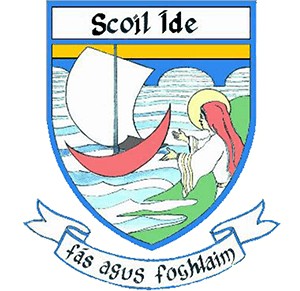Assessment
We believe the aim of assessment is the gathering of information so the teacher can better help the pupil to learn- not to classify or to label the child. Assessment should indicate both a child’s level of performance and his/her potential. Assessment outcomes should always be used to motivate and encourage and not to create a sense of failure.
We come to know the needs of the children through good observation and recording. We believe informal and formal screening and testing should take place at an early stage in the child’s education and continue through the primary school years. By doing so we identify:
- The child at risk.
- We obtain information about the pupil’s mastery of curricular objectives, which can be used by the teacher for further curricular planning.
- We diagnose learning difficulties requiring learning support.
- We identify learning strengths.
METHODS OF ASSESSMENT
- Teacher Observation: The most important form of assessment in Scoil Íde is the daily observation by the teacher of the pupil’s interests, attitudes, behaviour, strengths and weaknesses as indicators of the best way to help them develop and learn. By skilfully matching the level and type of work to the child’s needs and capabilities it can be ensured that learning does not become distasteful, demoralising or anxiety laden. This informal assessment is constantly under way in the classroom.
- Checking of Homework: This is more formal than classroom observation and questioning and can involve parents.
- Tests compiled by the teacher:
- Informal- simple tests e.g. mental arithmetic, tables, spellings.
- Formal- Criterion Tests e.g. Monthly, Christmas & Summer Tests. Standardised Tests:
-
- Belfield Infant Assessment Profile. This is used on selected children in Junior Infants about whom the Teacher has concerns.
- Middle Infants Standardised Test (MIST) is used in the 5th term at school to identify children with potential problems in English reading. The parents of “at risk” children are asked the school to meet the Learning Support Teacher who outlines a programme to them. The parents then implement the “Forward Together” Programme at home over a ten-week period. The children are tested again at the end of this period.
- Drumcondra Primary Mathematics Test is used on all classes from 1st to 6th in the summer term.
- Drumcondra Primary Reading Test is used on all classes from 1st to 6th in the summer term.
- Nfer Nelson Non Verbal Reasoning Tests are administered to all pupils in III standard. Nfer Nelson Verbal Reasoning Tests are administered to all pupils in IV standard. These scores are used as a check against Maths and Reading scores to check if children are attaining up to their potential.
- Micra-T and Sigma-T are used as supplementary assessment tests when necessary. Also in occasional use are Young Cloze Test (Various Levels) and SPAR spelling Tests.
These tests are administered so that we can
- Compare the performance of our children with the national performance.
- Identify children who are in need of Learning Support and/or extra educational challenges.
- Establish the reading levels of advanced readers.
- Check if pupils are fulfilling their potential.
- To enable us to record the progress of the children during their time in Scoil Íde.
COMMUNICATION OF ASSESSMENT
Communication with parents is an essential element of assessment. As is dealt with in another section of the school plan parents receive end of year online reports through the Aladdin system which parents can access at any time. Further communication takes place through informal contact, notes in the homework journal and the signing of completed tests or other work by parents. Assessment in individual subject areas is dealt with in the Curricular area of the school plan.
We believe that ongoing assessment is valuable as a means of charting children’s progress but it is not and should not be an end in itself. We must not overlook the importance of the child’s emotional development, his/her appreciation of music, drama, nature or poetry; his/her intuitiveness, sense of responsibility, communication skills etc.
We bear in mind at all times that we are dealing with complex human beings.
